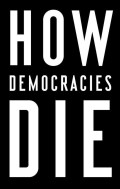Levitsky and Ziblatt are respected university scholars in the field of democracy. They analyze in How Democracies Die how some presidents or prime ministers undermine processes of democratic systems, values and norms in their own country.
Steven Levitsky and Daniel Ziblatt, both Harvard professors, present an excellent and well argued analysis of How Democracies Die not because of a military revolution but form the inside. Elected leaders destroy the democratic processes that brought them to power. Levitsky and Ziblatt analyze these antidemocratic processes in Venezuela, Georgia, Hungry, Nicaragua, Peru, the Philippines, Russia, Poland, Turkey, Ukraine; and Germany, Italy before the Second World War. These leaders no longer support the unwritten norms that belong to the constitution during their extreme polarization fights with opponents. Levitsky and Ziblatt conclude that history does not repeat itself, but it rhymes in these leaders’ behavior.
Often you hear that the citizens themselves should hold democratic values, so that democracy will be safe. But both scientists conclude that this vision is wrong. Because people are not able to shape at will the kind of government they possess. Only the political parties are the democracy gatekeepers. Levitsky and Ziblatt present some historical examples (Finland 1929, Belgium 1936 and Austria 2016) where political parties were first each other’s opponents for many years. But they were able to develop a government coalition in the interest of the country. The threatening otherwise was that a candidate of another party was to reject in words or and action the rules of the democratic game, he denied the legitimacy of opponents, tolerated or encouraged violence or indicated to curtail the civil liberties of opponents, including the media. In the USA both parties have an impressive positive record of gatekeeping until 2016.
In the history of the USA no extremists could win the presidency, although many authoritarians and extremists have dotted the political landscape without any firm commitment to democracy. The party gatekeeping as stewards was very strong. One of these dangerous figures that was kept out of the White House was Henry Ford (he hated bankers, Jews, women, Bolsheviks and was decorated by Adolf Hitler with the Grand Cross of the German Eagle). He was popular in the USA because he was a poor farm boy who made good. So in the history both parties found themselves in a dual imperative: choosing a popular candidate and at the same time as gatekeepers keeping out demagogues. The dominant question for the future could be: are the primaries for candidates too democratic?
Levitsky and Ziblatt say that after 2016 the candidate window was open to outsiders even without any political experience. Trump had switched his party registration several times and even contributed to Hilary Clinton’s campaign for the Senate. Including Nixon no presidential candidate demonstrated such a weak commitment to the constitution (“is just a paper”) and democratic values and norms as Trump. So the primary process had failed in its gatekeeping role. Levitsky and Ziblatt also ask themselves the question if the constitutional safeguard is enough to secure a democracy. Their answer is no, because a constitution always lead to competing interpretations. The American constitution does not give detailed information about the role of the presidency. So the presidency is a potent and potentially dominant institution. There are no limits in the constitution. That’s why Trump acts often with executive orders, proclamations, directives, memoranda and decrees like an ‘Imperial Presidency’.
The actual problem in the USA is that mutual tolerance and forbearance are weak and that’s why democracy is hard to sustain. But this process started before Trump. We read in How Democracies Die that the process of norm erosion started in the seventies with the republican chair of the House of Representatives, New Gingrich. For Gingrich politics were war fighting to get a majority. He used words like pathetic, sick, bizarre, betray, antiflag, anifamily and traitor; a real seismic shift in politics in the seventies. For him politics is warfare without common ground or compromise with the ‘enemy’. So the question could be if Trump is so deviant for his own Republican Party. Levitsky and Ziblatt conclude that under his leadership the United States of America is no longer the democracy promotor in the world because the United States are no longer a democratic model for other countries.
This bookreview is developed by Peter van den Boom.
